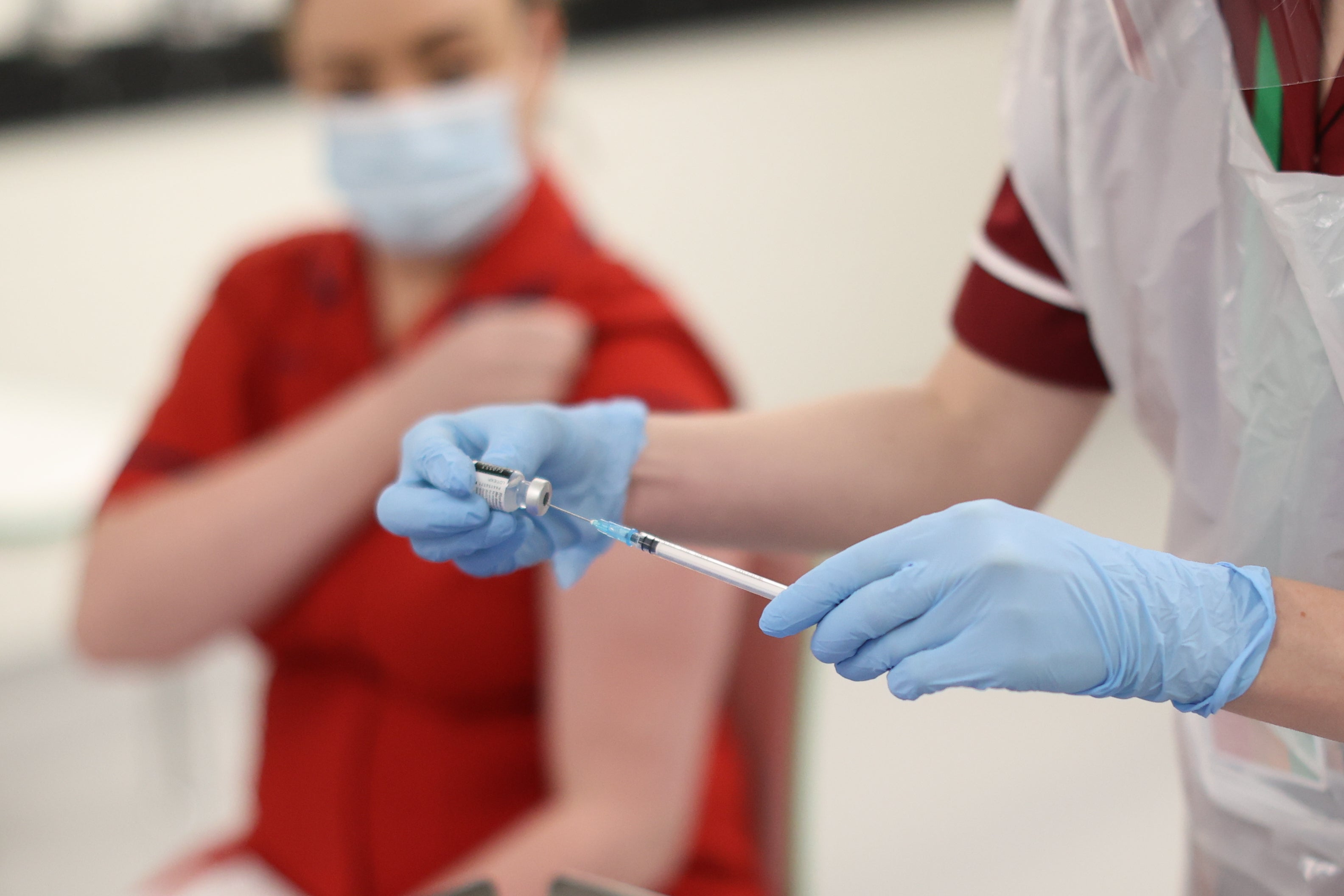Nurses and midwives call for delay to mandatory jab plans
Dismissing nursing staff during crisis would be ‘self-sabotage’, the Royal College of Nursing says as it called for the new policy to be delayed

Your support helps us to tell the story
From reproductive rights to climate change to Big Tech, The Independent is on the ground when the story is developing. Whether it's investigating the financials of Elon Musk's pro-Trump PAC or producing our latest documentary, 'The A Word', which shines a light on the American women fighting for reproductive rights, we know how important it is to parse out the facts from the messaging.
At such a critical moment in US history, we need reporters on the ground. Your donation allows us to keep sending journalists to speak to both sides of the story.
The Independent is trusted by Americans across the entire political spectrum. And unlike many other quality news outlets, we choose not to lock Americans out of our reporting and analysis with paywalls. We believe quality journalism should be available to everyone, paid for by those who can afford it.
Your support makes all the difference.Plans for mandatory Covid-19 jabs for frontline health workers in England could “backfire”, the Royal College of Nursing has warned as it called for the new policy to be delayed.
It states that to dismiss valued nursing staff during this crisis “would be an act of self-sabotage” as the NHS faces major staffing shortages.
The warning comes as the Royal College of Midwives (RCM), which states that current staff absences are at their highest level since the pandemic began, said the policy could have a significant impact on maternity services.
The RCM said there are “chronic understaffing” issues in the sector – with an estimated shortfall of around 2,000 midwives, it added.
Both Colleges have called for an immediate delay to plans for mandatory Covid-19 jabs for frontline staff who must be fully vaccinated with two jabs by April 1 – meaning they must have had their first vaccine on February 3.
Those who do not have the vaccination and cannot be redeployed are expected to lose their jobs, the RCN believes.
The RCN says the unrelenting pressure nursing staff have been under for nearly two years along with there being around 40,000 registered nurse vacancies in the NHS in England has compromised patient safety.
The Government’s own impact assessment warns 73,000 NHS staff in England could be lost, making the nursing workforce crisis even worse.
Pat Cullen, the RCN’s general secretary and chief executive, said: “Nothing matters more to a nurse than caring for their patients safely. Right now, our members are telling me they can’t always do that.
“We are calling on the Government to recognise this risk and delay a move which by its own calculations looks to backfire.
“To dismiss valued nursing staff during this crisis would be an act of self-sabotage.
“Encouraging people to get vaccinated is the best way to boost vaccine take-up.
“Nursing staff, who are well-placed to understand people’s concerns and are highly trusted by them, have led the Covid-19 vaccination programme and have a key role to play in addressing any concerns people may have about being vaccinated.”
It’s no surprise that staff absence is currently at its highest in the pandemic so far. Moving forward with mandatory vaccination could only see staffing levels fall further.
Gill Walton, chief executive of the RCM, said: “Since the arrival of the Covid-19 vaccine the RCM has been urging its eligible midwife and maternity support worker members to have the jab to protect themselves, their families and the women and families they care for.
“We believe that it’s the right thing to do and we believe in the science.
“However, we do not believe mandatory vaccination is the correct approach, and actively argued against the proposal.
“Levels of vaccination in the NHS are high and rising and we should be using discussion, persuasion and education to increase vaccination among NHS staff, not the hammer blow of mandating it.”
She added: “I appeal to the Health Secretary to reconsider his decision and to delay the implementation.
“Throughout the pandemic, maternity staff have fought to keep services open and to provide the best care to women and families.
“It has been unrelenting and so it’s no surprise that staff absence is currently at its highest in the pandemic so far. Moving forward with mandatory vaccination could only see staffing levels fall further.
“The Government has opened a Pandora’s Box of unforeseen consequences – but there is an opportunity now to close it. We are urging Sajid Javid to do just that.”
The call comes after Health Secretary Sajid Javid was challenged about the proposal by an unvaccinated ICU doctor.
A Department of Health and Social Care spokesman said: “NHS and care staff do amazing work and we are thankful to those who have chosen to get the vaccine.
“Health and social care workers are responsible for looking after some of the most vulnerable people in society, many of whom are more likely to suffer serious health consequences if exposed to the virus.
“This is about patient safety, and ensuring people in hospital or care have as much protection as possible. Vaccinations remain our best defence against Covid-19.”